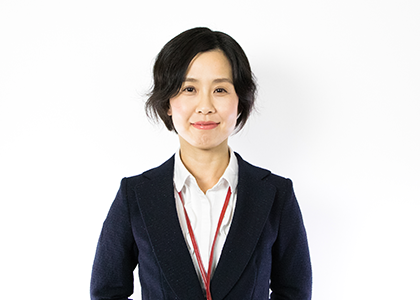

Ryoko NAGAI
Associate Professor
Area of expertiseJapanese linguistics, discourse analysis, pragmatics, Japanese language education
Classes taught
Introduction to Communication, Understanding Japanese Company Culture, Multicultural Communication Seminar, Japanese language classes for international student
Short biography
Academic background:
2003 Graduated from the College of Japanese Language and Culture, University of Tsukuba: Bachelor’s Degree (Literature)
2006 Completed the Japanese Language Course, Master’s Program in International Area Studies, Graduate School of Humanities and Social Sciences, University of Tsukuba: Master’s (Area studies)
2010 Completed the Doctoral Program in Applied Linguistics, Graduate School of Humanities and Social Sciences, University of Tsukuba: PhD (Linguistics)
Professional background:
2004 Stendhal-Grenoble 3 University (Language Lecturer)
2009 Japan Foundation Japanese-Language Institute, Kansai (Japanese Language Education Specialist)
2010 International Student Center, Yamaguchi University (Lecturer)
2014 International Student Center, Yamaguchi University (Associate Professor)
2015 Faculty of Global and Science Studies, Yamaguchi University (Associate Professor)
Major papers, books, and works
1. Shima, C., Nagai, R., 2007, “The possibilities of video letter projects” (peer reviewed) Japanese Language Education in France, 3, pp. 57-64 2. Nagai, R., 2007, “The management of discourse change in moshiokuri nurse reports: With a focus on the strategy of style-shifting” (peer reviewed) Japanese Language Education, 135, pp. 80-89 3. Nagai, R., 2007, “The interaction in “moshiokuri” nurse reports: Comparing with chats in workshops (peer reviewed) Studies in Applied Linguistics, 14, pp. 73-86 4. Nagai, R., 2009, “Trial of an introductory debate preparation class,” (peer reviewed) Bulletin of the University of Tsukuba International Student Center, 24, pp. 85-95 5. Noborizato, T., Nagai, R., 2011, “Action Report on a Japanese Listening Class of “Moshiokuri” for “Kaigofukushi-shi” (Caregiver) Candidates,” (peer reviewed) Japan Foundation Japanese-Language Education Bulletin, No. 7, pp. 85-102 6. Nagai, R., 2012, “Discourse structure for ‘moshiokuri’ by nurses” (peer reviewed) Beijing Research Journal, No. 8, pp. 38-51 7. Yamane, C. (supervisor), Yamane C., Nagai, R., et. al. (writers), 2013, Kenkyusha’s Dictionary of Japanese Colloquial Expressions, Kenkyusha 8. Namatame, T., Nagai, R. 2013, “Use of adjectives “takai” and “ookii” with nouns concerning numerical number: Illustrations from BCCWJ corpus” (peer reviewed) Tsukuba Working Papers in Linguistics Online Edition, No. 6 (Total volumes: 32), pp. 49-68 9. Basic Verb Handbook (writing duties shared) http://verbhandbook.ninjal.ac.jp/
| Degree | PhD (linguistics) |
|---|---|
| nagair%40yamaguchi-u%2Eac%2Ejp |